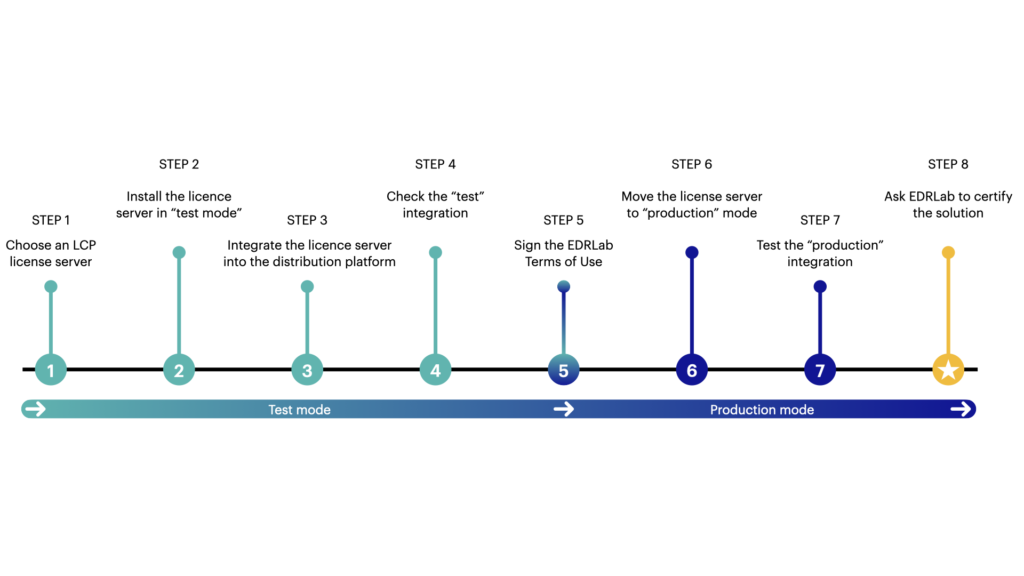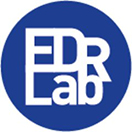Readium LCP

Become an LCP license provider
This document details the steps required to become a Readium LCP license provider, i.e. install an LCP license server as part of an EPUB distribution service.
 Step 1: Choose an LCP license server
Step 1: Choose an LCP license server
An organisation may choose to develop its own LCP license server, from the public specifications found on the Readium Foundation website under the name “Licensed Content Protection” (LCP) and “License Status Document “ (LSD).
To ease deployments of LCP solutions, EDRLab has developed an open-source license server, using the Golang language. The software is multi-platform; it has been successfully tested on MacOS, Linux and Windows.
You’Il find it on https://github.com/readium/readium-lcp-server, distributed with a BSD-3 license. Currently supported databases are SQLite, MySQL and SQLServer; PostgreSQL will be added during 2021, and a future major evolution will be based on an ORM (Object Relational Mapper) which will allow the use of new DBMS.
Several alternative commercial solutions, with professional support, have been developed by EDRLab partners (members of our association); please contact EDRLab if you want some details.
Organisations having developed their own LCP server software can jump to step 5.
Step 2: install the license server in “test” mode
Please study the project Wiki as a first step.
This software suite is made of one utility and three server deamons :
- The content-encryption utility can be integrated into any distribution workflow. It takes a few parameters and outputs an EPUB file with encrypted content plus the corresponding encryption key. Optionally, it can send a notification to the license server. The encrypted content can be put online securely on the Web if the encryption key is correctly protected.
- The license server (aka LCP server) is positioned in the company’s local network and should not be directly accessible from the Web. Its role is to generate licenses on demand. It keeps no information about license users, but it stores the content encryption keys: that is why its database must be protected appropriately.
- The status document server (aka LSD server) is positioned in the DMZ and visible to the Web: client applications will exchange messages with it. This server must be able to communicate with the LCP server via a REST API.
It is possible to deploy these servers on different machines, possibly via Docker containers (EDRLab has prepared such a deployment, but it needs to be updated). For testing purposes, it is also possible to install every server on the same machine.
By default, the downloaded LCP server runs in “test” mode: the LCP specification defines it as the “basic profile”. The server will be switched to “production” mode later, after some confidential information has been set.
Step 3: integrate the license server into the distribution platform
The Readium LCP server project wiki contains a description of the REST API of the different servers and the overall architecture of a complete solution, and detailed information on how to integrate the LCP server into an existing solution.
When a user is acquiring a publication, the provider’s platform must generate a license request and pass the necessary information to the LCP server, retrieve the license, and return it to the calling system. Encrypted content may be fetched directly from the provider’s storage or through a reverse-proxy server, depending the architecture of the provider’s platform. Events related to the evolution of the license (register, renew, return) will be directly handled by the LSD server.
Step 4 : check the “test” integration
There are several ways to test that an LCP Server is correctly installed:
Automatic testing: we have developed an LCP checker, a command line utility which takes a license as input and checks different aspects of its use by an LCP compliant application.
Thorium Reader: This free public application can open “test” LCP licenses. Just drag & drop a license on its main window, enter the passphrase and check that you can read the book.
R2 Reader: Mobile Readium open-source reader software supports the “test” variant of the Readium LCP DRM. It is possible to compile the iOS and Android versions of this app from Readium’s Github. Just import a license into the app, enter the passphrase and check that you can read the book.
Step 5: sign the EDRLab Terms of Use
EDRLab is responsible for managing the “Readium LCP network”, i.e. all the interoperable nodes of this distributed solution. EDRLab, therefore, manages the certificates of the LCP PKI and must check all reading applications and license servers of this network for compliance with the specifications.
The LCP Agreement drafted by EDRLab commit organizations participating to the LCP Network to respect the DRM specifications and to set up sufficiently secure and truly interoperable systems.
Signing the LCP Agreement also requires license providers to allow EDRLab to verify their solution’s conformity and to pay EDRLab a certain amount each year for this task. Read this FAQ entry for more details.
Step 6: move the license server to “production” mode
Once the ToUs are signed, EDRLab securely delivers to the license provider:
- an X509 certificate that identifies the provider, to be integrated in the LCP server;
- the corresponding private key, to be integrated in the LCP server;
- a small software library to integrate into the LCP server code;
- a script that makes it easy to patch the LCP server code.
This information is confidential and must be protected by the license provider.
Step 7: test the “production” integration
R2 Reader software for iOS and Android, Readium Desktop, Lisa reader, Baobab reader, all support “production” grade LCP licenses. Load them from their respective stores to test the final integration.
Step 8: ask EDRLab to certify the solution
Once the integrator has appropriately tested the system, he will have to provide EDRLab with some license samples:
3 licences of type “buy” (no start/end date)
- b1 = ready state, any print or copy constraints
- b2 = cancelled state
- b3 = revoked state.
2 licences of type “loan” (with start/end dates)
- l1 = ready state, loan duration between one week and one month
- l2 = expired state.
If the platform provides EPUB files embedding their LCP license:
- e1 = protected EPUB file with a “buy” license.
The supplier must provide the passphrase associated with each license.
Once all tests have passed positively, EDRLab will return a test report and an “LCP Certified” logo to the supplier, logo which can be displayed on a provider’s website or reading application.
Other Readium projects
Readium-2
The major evolution of the Readium SDK codebase, the objectives being better performances and stability, clarity of source code and documentation.
Readium SDK & JS
The reference EPUB 3 open-source reading engine for Web, desktop and mobile apps, on active maintenance by the Readium community.






 contact@edrlab.org
contact@edrlab.org +33 1 83 64 41 34
+33 1 83 64 41 34
